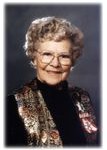 Emmie Ducie Oddie, C.M., S.O.M., is considered a prairie icon for her years of service to the rural community. For nearly five decades she used her home economics training to answer questions from readers of her column in The Western Producer. Emmie died July 6, 2013, in Saskatchewan at the age of 97 (obituary).
Emmie Ducie Oddie, C.M., S.O.M., is considered a prairie icon for her years of service to the rural community. For nearly five decades she used her home economics training to answer questions from readers of her column in The Western Producer. Emmie died July 6, 2013, in Saskatchewan at the age of 97 (obituary).
This commitment to farm families was appropriate, as she was born to prairie life. The Ducie family farmed in Saskatchewan through the drought and depression of the 1930s. After elementary education at Coates, a one-room rural school, Emmie completed her high school through government correspondence courses. During the same period she obtained an A.T.C.M. in piano and became involved in the Girls’ Homecraft Clubs established by Edith Rowles.
Times improved, and in 1941 Emmie graduated from the University of Saskatchewan with a Bachelor of Household Science. In 1943, she earned a Master of Science degree from Washington State College with a major in nutrition and minors in household management and rural sociology.
Putting Home Economics Into Action
After completing a summer of employment giving canning demonstrations arranged by the Canada Department of Agriculture, Emmie left for Toronto where she worked as nutritionist for the local branch of the Red Cross. In 1945, she returned to Saskatchewan to become Supervisor of Girls’ Work for the Extension Division of the University of Saskatchewan. She left the position in 1946 to marry Langford Oddie, who was the Agricultural Representative at Assiniboia.
The birth of two children, coupled with a move to the farm, permitted Emmie to use her discretionary time to begin a weekly question and answer column in The Western Producer. First known as “Emmie Oddie’s Column”, it was later changed to “I’d Like to Know”. A deep empathy developed over the years between writer and readers.
Community Service
Emmie also used her home economics background as a 4-H leader and as a judge at 4-H Achievement Days and fairs. The organization of a local Homemakers’ Club, later known as Women’s Institute, led to years of involvement at district, provincial and national levels, eventually leading to the national presidency of Federated Women’s Institutes of Canada from 1979 to 1982.
In addition, Emmie served on several boards and commissions, including 10 years as a member of the Saskatchewan Arts Board, 16 years as a member of the Saskatchewan Milk Control Board, and two years of intensive work on a task force on item pricing. She also continued her membership in professional organizations, serving one term as president of the Saskatchewan Home Economics Association and later representing that body on the University of Regina Senate.
Back to University as a Lecturer
In 1969, when her children reached university age, Emmie accepted a teaching position as a special lecturer with a joint appointment to the College of Home Economics and the Extension Division, University of Saskatchewan. Her husband, an agrologist by training, found employment on campus with the Farm Economics Branch, College of Agriculture, during the winters of 1970 and ’71.
During her university assignment, Emmie updated some of her own classes through Perdue University. She resigned in 1973 to return to farm life and to devote more time to her newspaper column, which she maintained despite her teaching responsibilities. She retired as Western Producer columnist in 1995. Her husband, Langford, died in 1996.
Just Rewards
Emmie Oddie’s remarkable contributions to the profession and rural women’s organizations have been recognized by numerous life memberships and several prestigious awards. She is a life member of the Association of Saskatchewan Home Economists Association and Canadian Home Economics Association, the Saskatchewan Women’s Institutes and the Federated Women’s Institutes of Canada. In 1997, the Saskatchewan Home Economics Teachers Association also made her a life member, a gesture she particularly appreciated because many members of the granting body were students when she taught at the University of Saskatchewan.
Her dedication to the profession and community was recognized in 1982 when she received the Honour Award from the Canadian Home Economics Association. In 1983, she was inducted into the Saskatchewan Agricultural Hall of Fame and the same year received the Consumer Award of Merit from the Saskatchewan Department of Consumer and Commercial Affairs. In 1984, she was named a member of the Order of Canada, and in 1986 received the Women Helping Women award from Soroptimist International of Regina. She received appreciation awards from both the Saskatchewan 4-H Council and the University of Regina Senate.
In 1991 she received the Saskatchewan Order of Merit in recognition of her contribution to the well-being of the province through the field of home economics. The citation accompanying it captures the essence of her lifetime of service, stating in part, “Your membership on boards, commissions, task forces on agriculture, home economics, education and women’s issues has added immeasurably to the quality of life of Saskatchewan people.”
Mentor role a natural fit for columnist Oddie
By Diane Rogers
Western Producer, December 14, 1995
https://www.producer.com/1995/12/mentor-role-a-natural-fit-for-columnist-oddie/
REGINA, Sask. – Emmie Oddie, reflecting on a 50-year writing career with The Western Producer, credits two women for leading her to the path she followed.
One is her mother, Emma Ducie, who was active in the homemakers’ clubs and the other is Edith Rowles, an extension worker who later was dean of the home economics college at the University of Saskatchewan.
In an interview in her Regina home where she and her husband now live, Emmie recounted youthful memories of reciting poetry while washing dishes on the Ducie farm near Dundurn, Sask. She took high school by correspondence course and her mother, a former teacher, and older sister Rose, were always there to prompt her. She went to live in nearby Saskatoon with her sister who was teaching English at a business school and who later joined The Western Producer editorial team.
Emmie sold piano lessons at 50 cents apiece and remembers, “you’d soon starve at that rate.” So she went to the U of S and got her bachelor’s degree in household science, then followed up with a masters in nutrition in Washington state in 1943.
Looking around for a job, she worked as a nutritionist for the Red Cross in Toronto. Her role was to hold clinics to teach new mothers about raising healthy babies. It wasn’t an “uproarious success” Emmie forthrightly admits, saying she would do it differently today.
That experience of working in groups undoubtedly helped Emmie when she returned to Saskatchewan in 1944 to work at the U of S extension department as supervisor of girl’s clubs, the forerunner to 4-H. She travelled the province and resumed a long distance relationship with Langford Oddie, a fellow she had met in university who was now the agricultural representative in Assiniboia, Sask. They married in 1946 and Emmie quit her job and moved to Assiniboia.
Among the congratulations on her marriage came a letter from Gertrude Telford, then organizer of CCF clubs, the predecessor of the New Democratic Party. It’s a letter that Emmie pulls out of her room crammed with files that is just as relevant today. Telford’s advice: “Do try to carry on with as much as you can in the line in which you are educated. It is one of the grave problems of today for we women to know how to co-ordinate our work as the makers of homes and our rights as citizens to independent employment and income.”
Emmie didn’t stay idle. She became active in Women’s Institute work and started writing the occasional article for The Western Producer then becoming a weekly columnist in 1949.
Life on the farm continued throughout Emmie’s other career. She and Langford started farming at Milestone on his dad’s land, then moved 100 kilometres to Tregarva. For a time they farmed in both places. Emmie laughs when she recalls that “it always worked out that when we got to Milestone, it rained.” After early ventures with pigs and cattle they settled into straight grain. They have two children, Will who now runs the farm and Rosemary, a librarian in Regina.
Emmie was also an activist, particularly with the Saskatchewan Women’s Institutes, again due to family ties.
“Mother was a feminist, so one had this influence always.”
The WIs brought fellowship, education and fun to isolated prairie women. Emmie rose through the ranks, serving as president of her branch, then the district and the province, the latter from 1973-75. She became national president from 1979-82. But WI membership is falling now. Emmie said that’s partly because WI tended to avoid taking issues by the teeth.
“This was a sorrow to me. I can recall going to meetings and saying they should concern themselves with issues of the day. They would smile at me.”
Of course Emmie notes even the farm women’s network that does take on issues is facing shaky membership. So perhaps a decline was inevitable for the WIs too.
It’s maybe a function of TV she muses, since it’s so easy to sit down and just be entertained at home.
“Plus, it takes two incomes to support a family farm. Looking at Tregarva, the young women are all working off the farm. … People in my old farm area hardly know one another. There’s no visiting with off-farm work and larger farms.”
A busy life
Activities:
Saskatchewan Arts Board 1953-61.
Saskatchewan Milk Control Board 1964-80.
Sat on Saskatchewan Advisory Council for the Status of Women, 1976-77.
Sat on the Senate of the University of Regina.
Served as a faculty member of the University of Saskatchewan home economics college 1969-73.
Awards and honors:
1982 honor award from the Canadian Home Economics Association.
1983 she received the Saskatchewan Consumer Award of Merit, also named to the Saskatchewan Order of Merit and to the Saskatchewan Hall of Fame.
1984 received the Order of Canada.






